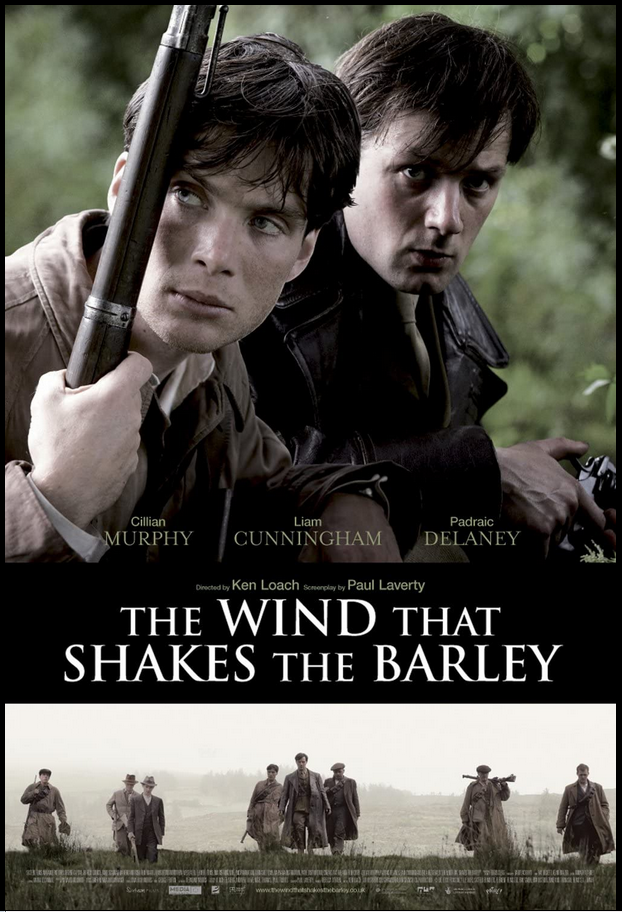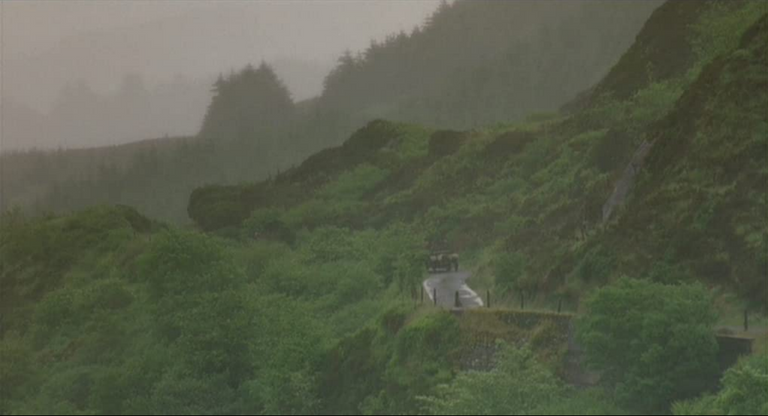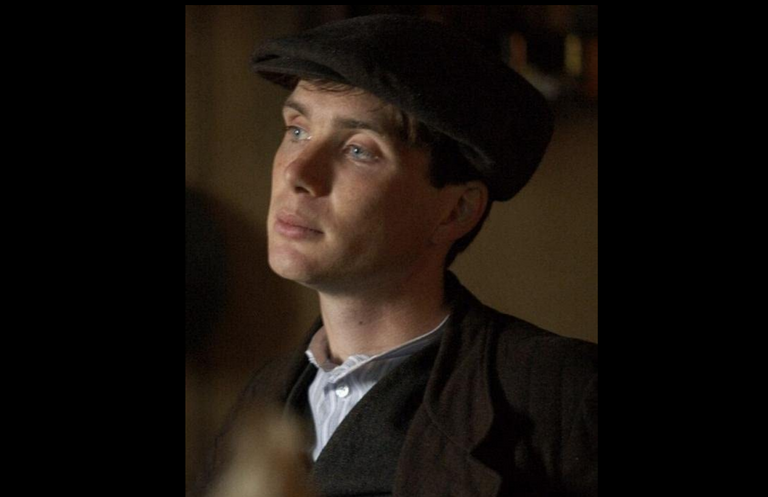[ENG/ESP] The Wind That Shakes The Barley by Ken Loach, an intense and emotional film. / El Viento Que Acaricia La Cebada de Ken Loach, una película intensa y emotiva. |REVIEW/RESEÑA!

Streaming platforms with multimedia content at the beginning and then real movie production companies such as NetFlix and Amazon to name the two main ones have accustomed us to identify, with the series, certain actors, hitherto unknown to the general public.
And this is the advantage (and the strategy) of all these series that are even available in their entirety, most of them, in full season version, i.e. downloading all the chapters at once.
When arriving massively to the movie we do not have to wait for the announcements of past times in which we waited anxiously for the premiere of the movie, when we could see it in our respective countries and cities, to get in close contact "with the actor".
From that moment on we identified that face with the character at the moment of watching the movie and after a certain time we forgot it.
The current series produce with the actors the same effect of a pneumatic hammer on the asphalt: they hit and hit in our memory until they fix for a week, a month or a whole season the face of an actor and the characteristics of his character.
And we don't realize that this actor/character maybe has a long career in the theater or in other sectors of the show business.
Today I want to share with the cinephile @hivers of this Community an excellent movie starring the actor who has represented by himself one of the most successful series produced by NetFlix in recent years, with an excellent specialized criticism and a dazzling scenery: it is Peaky Blinders and the actor is Cillian Murphy. And the movie I want to talk about today is The Wind That Shakes the Barley released in Latin America with the name slightly changed: El viento que acaricia el prado.
Cillian Murphy starred in this film in 2006 almost five years before he began filming the acclaimed series set in Birmingham, in 2013.
The film was shot in County Cork (Ireland) and the original title The Wind That Shakes the Barley explicitly refers to the verse of a song by Robert Dwyer Joyce (19th century).
The Wind That Shakes the Barley was directed by Ken Loach and won the Palme d'Or at the Cannes Film Festival in 2006.

Las plataformas via streaming con contenidos multimediales al inicio y después verdaderas productoras cinematográficas como NetFlix y Amazon por citar las dos principales nos han habituado a identificar, con las series, determinados actores, hasta ese momentos desconocidos al gran público.
Y esta es la ventaja (y la estrategia) de todas estas series que incluso son disponibles en su totalidad, la mayor parte, en versión temporada completa, es decir descargando todos los capítulos de una sola vez.
Al llegar masivamente al película no tenemos que esperar los anuncios de tiempos pasados en los cuáles esperábamos con ansia el estreno de la película, cuando podíamos verla en nuestros respectivos países y ciudades, para entrar en estrecho contacto "con el actor".
A partir de ese momento identificábamos ese rostro con el personaje en el momento de ver la película y pasado un cierto tiempo lo ibamos olvidando.
Las series actuales procuden con los actores el mismo efecto de un martillo pneumático en el asfalto: golpean y golpean en nuestra memoria hasta fijar durante una semana, un mes o una entera temporada el rostro de un actor y las características de su personaje.
Y no nos damos cuenta que ese actor/personaje tal vez tiene un largo recorrido en el teatro o en otros sectores del espectáculo.
Hoy quiero compartir con los @hivers cinéfilos de esta Comunidad una excelente película protagonizada por el actor que ha representado por si mismo una de las series más exitosas producidas por NetFlix en los últimos años, con una excelente crítica especializada y una escenografía deslumbrante: se trata de Peaky Blinders y el actor es Cillian Murphy. Y la película de la cuál hoy les quiero hablar es El viento que acaricia la cebada estrenada en Latinoamérica con el nombre ligeramente cambiado: El viento que acaricia el prado.
Cillian Murphy protagonizó esta película en el año 2006 casi un lustro antes de que comenzara a rodar la aclamada serie ambientada en Birmingham, en el 2013.
La película se rodó en el condado de Cork (Irlanda) y el título original The Wind That Shakes the Barley (El viento que agita la cebada) se refiere explícitamente al verso de una canción de Robert Dwyer Joyce (siglo XIX).
El viento que acaricia la cebada fue dirigida por Ken Loach y ganó la Palma de Oro en el Festival de Cannes en el 2006.

We are in the midst of the struggle for independence in Northern Ireland through its armed wing, the IRA, against the British army.
In this context, Damien O'Donovan (played by Cillian Murphy) is a young doctor and is about to leave Ireland to work in a London hospital, while his brother Teddy (played by Padraic Delaney) is an active militant of the IRA (Irish Republican Army) who actively fights and even commands its local column.
The events begin to precipitate when the English army, in one of its routine controls, gives a tremendous beating to Micheál Ó Súilleabháin, Damien's friend, leaving him dying, further convincing him to leave his native country, since he considers that fighting in those conditions against the English is impossible. With scattered columns of volunteers who must fight against an organized and powerful army that seeks to eliminate them.
However, doubt begins to germinate in his mind about whether to leave or to stay even at the risk of fighting for a lost cause. The umpteenth abuse of power by the British when he is about to take the train will be decisive and will convince him to stay.
Damien decides to join the IRA rebels in the armed column whose commander is his brother, who organizes a reprisal to avenge the brutal murder of his friend Micheál. They decide to storm the local barracks held by the British to recover weapons and kill four British auxiliaries.
An Anglo-Irish landowner, Sir John Hamilton, who is in fact a collaborator of the British forces, forces one of his servants, who is a member of the IRA, to reveal to him where they are hiding, and in this way Damien's entire brigade is captured and taken prisoner.
In prison both brothers are interrogated and stoically endure the torture to which they are subjected without denouncing their comrades. A Scottish soldier of the British army, who actually has Irish origins but has managed to hide, takes care of them and helps them escape along with the rest of the captured rebels who were predestined to a tragic end.
In the most convulsive moments of the conflict and already acting only for revenge Damien, who has provisionally taken over the command of the armed column in replacement of his brother who had not yet recovered from the wounds suffered during the torture, captures the collaborator Sir John Hamilton and the traitor - although forced - Chris, trying to exchange them with three members of the IRA who are in the hands of the British army.
But upon receiving the proposal, the British, in a gesture of disdain, kill the IRA members, rejecting any exchange or peace negotiations. In this situation Damien and his brigade are ordered to execute the two hostages, although one of them -Chris- is Damien's friend.
In a continuous back and forth of actions between the two, the first peace negotiations between the two sides take place.
The formal ceasefire between the British and the IRA and the conclusion of the peace treaty, welcomed by the whole population, tired by so many years of war, finds the IRA leadership divided between those who accept it and those who reject it, especially arguing -the latter and rightly so- that the terms of the treaty only grant Ireland a partial and very weak independence.
And this difference of opinion is evident even between the two brothers. Teddy, who at the beginning was prone to armed struggle, decides to accept the peace treaty in order to avoid further bloodshed, while Damien, who at the beginning was the more cautious and ambiguous in his manifestation towards armed struggle, has hardened his character and wants to continue fighting until absolute independence is achieved.
Teddy's position prevails over Damien's, thus forming the new Irish Free State and the uniformed Irish republican army that replaces the English army in its police and control functions.
This decision on the part of his brother and the group that supports them is not well taken by Damien and his companions of more extreme Marxist ideas who feel betrayed and claim the struggle by breaking out the Irish Civil War, initiating a guerrilla war trying to weaken the power of the new Irish army.
Meanwhile, the British army and the British authorities remain crouched in the shadows, waiting for Teddy to fail to control his brother to intervene again, especially those sectors of the armed forces that had always been reluctant to the armistice and had the idea of treating Ireland in a subaltern way, almost as if it were a colony.
In a context in which violence does not diminish, Teddy begins a struggle to control his brother Damien with uncertain results. In the midst of this struggle, Damien is captured and, when he refuses to betray and betray his comrades, his brother has no choice but to condemn him to the firing squad. Damien, who was always afraid of being involved in a fratricidal war, realizes that once he enters it, the only way out is death.

Estamos en plena efervescencia entre la lucha que sostiene Irlanda del Norte por su independencia a través de su brazo armado, el IRA, contra el ejército inglés.
En ese contexto, Damien O'Donovan que se mantiene algo alejado de las luchas políticas (interpretado por Cillian Murphy) es un joven médico y está a punto de dejar Irlanda para ir a trabajar en un hospital de Londres, mientras que su hermano Teddy (interpretado por Padraic Delaney) es un activo militante del IRA ('Irish Republican Army) el Ejército Republicano Irlandés que combate activamente y comanda incluso la columna local del mismo.
Los acontecimientos comienzan a precipitar cuando el ejército inglés, en uno de sus controles de rutina, le da una tremenda paliza a Micheál Ó Súilleabháin, amigo de Damien, dejándolo moribundo, convenciéndolo más aún a dejar su país natal, ya que considera que luchar en esas condiciones contra los ingleses es imposible. Con columnas dispersas de voluntarios que deben luchar contra un ejército organizado y potente que busca eliminarlos.
Sin embargo, la duda comienza a germinar en su mente sobre si irse o quedarse aún con el riesgo de luchar por una causa perdida. El enésimo abuso de poder por parte de los británicos cuando está por tomar en tren será determinante y lo convencerá de quedarse.
Damien decide de unirse a los rebeldes del IRA en la columna armada cuyo comandante es su hermano, quien organiza una represalia para vengar el brutal asesinato del amigo Micheál. Deciden tomar por asalto el cuartel local en manos de los ingleses para recuperar armas y matan a cuatro auxiliares británicos.
Un terrateniente angloirlandés, Sir John Hamilton que, en realidad, es un colaborador de las fuerzas británicas obliga a uno de sus sirvientes -que es miembro del IRA-, a revelarle donde se esconden, y de esta manera manera toda la brigada de Damien es capturada y tomada prisionera.
En la cárcel ambos hermanos son interrogados y soportan con estoicismo la tortura a la que son sometidos sin denunciar a sus compañeros. Un soldado escocés del ejército británico, que en realidad tiene orígenes irlandeses pero que ha logrado ocultar, se apiada de ellos y los ayuda a escapar junto al resto de los rebeldes capturados que eran predestinados a un trágico final.
En los momentos más convulsionados del conflicto y ya actuando movido solo por la venganza Damien, que se ha hecho cargo provisoriamente del comando de la columna armada en reemplazo de su hermano que aún no se había restablecido de las heridas sufridas durante la tortura, captura al colaborador Sir John Hamilton y al traidor -aunque obligado- Chris tratando de intercambiarlos con tres integrantes del IRA que están en manos del ejército inglés.
Pero al recibir la propuesta los británicos en un gesto de desdén matan a los integrantes del IRA rechazando cualquier intercambio o tratativas de paz. Ante esta situación Damien y su brigada reciben la orden de ejecutar a los dos rehenes, aunque uno de ellos -Chris- sea amigo de Damien.
En un continuo ir y venir de acciones y escaramuzas entre ambos bandos llegan las primeras tratativas d epaz entre ambos bandos.
El alto del fuego formal entre los ingleses y el IRA y la celebración del tratado de paz, acogido favorablemente por toda la población, cansado por tantos años de guerra, encuentra a la cúpula del IRA dividida entre los que lo aceptan y aquellos que lo rechazan, sobre todo argumentando -estos últimos y con razón- que los términos del mencionado tratado sólo conceden a Irlanda una independencia parcial y muy débil.
Y esta diferencia de opiniones se hace manfiesta incluso entre los dos hermanos. Teddy que al inicio era propenso a la lucha armada, decide de aceptar el tratado de paz para evitar más derramamiento de sangre, mientras que Damien que al inicio era el más cauteloso y ambiguo en su manifestación hacia la lucha armada, ha endurecido su carácter y quiere seguir luchando hasta conseguir la independencia absoluta.
La posición de Teddy prevalece sobre la de Damien quedando formado, de esa manera, el nuevo Estado Libre de Irlanda y el ejército republicano irlandés uniformado que sustituye al ejército inglés en sus funciones de policía y control.
Esta decisión por parte de su hermano y el grupo que los apoya no es bien tomada por Damien y sus compañeros de ideas marxistas más extremas que se sienten traicionados y reivindica la lucha haciendo estallar la Guerra Civil Irlandesa, iniciando una guerra de guerrillas tratando de debilitar el poder del nuevo ejército irlandés.
Mientras tanto, el ejército inglés y las autoridades británicas s emantienen agazapadas, en la sombra, esperando que Teddy no logre controlar a su hermano para intervenir de nuevo, especialmente aquellos sectores de las fuerzas armadas que siempre habían sido reacios al armisticio y conservan la idea de tratar a Irlanda en forma subalterna, casi como si fuera una colonia.
En un contexto en el cual la violencia no mengua, Teddy comienza una lucha tratando de controlar a su hermano Damien con resultado incierto. En medio de esa lucha, Damien es capturado y, ante la negativa de traicionar y delatar a sus compañeros, a su hermano no le queda otra alternativa que condenarlo al pelotón de fusilamiento. Damien que siempre tenía miedo de verse envuelto en una guerra fratricida, se da cuenta de que una vez entrado en ella la única manera de salir es con la muerte.


Cillian Murphy as/como: Damien O'Donovan
Padraic Delaney as/com: Teddy
Antony Byrne as/com: El interrogador
Fiona Lawton as/com: Lily
Gerard Kearney as/com: Donacha
Liam Cunningham as/com: Dan
Martin Lucey as/com: Congo
Mary Murphy as/com: Bernadette
Orla Fitzgerald as/com: Sinéad
William Ruane as/com: Johnny Gogan

What can I add about a film that has won the Palme d'Or at the Cannes Film Festival. A superb script where, at times, a crude realism is mixed with the emotional impact that the facts show, especially for those who do not know in depth the so-called "Irish question", that war between England and Ireland that left a huge aftermath of deaths, attacks and destroyed families, for a conflict that was not only religious.
The Wind that Caresses the Barley does not only talk about history and politics -although it teaches us a lot about it- but it also shows different sides of the complex historical passage that meant that treaty that put an end to that true civil war.
The love stories are just a complement, in times of love and war as the remembered Gabriel García Márquez would say, a story that begins with two brothers fighting for the same ideals and culminates with one killing the other in the name of respect - ironically enough - for those same ideals.
Absolutely recommended. Excellent actors, great direction and a script with no weak points in a film that shows us all the weaknesses of the human condition in times of war when men are forced to repress their own feelings and their dearest affections for something greater, which is priceless to them: peace, freedom and the independence of their own country.

Que puedo agregar de una película que ha ganado la Palma de Oro del Festival de Cannes. Un guión soberbio donde se mezclan, por momentos, un crudo realismo con el impacto emocional que los hechos muestran, sobre todo para aquellos que no conocemos a fondo la llamada "cuestión irlandesa", esa guerra entre Inglaterra e Irlanda que dejó una enorme secuela de muertes, atentados y familias destruídas, por un conflicto que, no solo era religioso.
El viento que acaricia la cebada no sólo habla de historia y política -aunque nos enseña bastante al respecto sino que muestra distintas aristas del complejo pasaje histórico que significó ese tratado que puso fin a esa verdadera guerra civil.
Las historias de amor son solo un complemento, en tiempos de amor y de guerra como diría el recordado Gabriel García Márquez, una historia que comienza con dos hermanos luchando por los mismos ideales y que culmina con uno que mata al otro en nombre del respeto -valga la ironía!- de esos mismos ideales.
Absolutamente recomendada. Excelentes actores, estupenda dirección y un guión sin puntos débiles en una película que nos muestra todas las debilidades de la condición humana en tiempos de guerra cuando los hombres son obligados a reprimir sus propios sentimientos y sus afectos más queridos por algo más grande, que no tiene precio para ellos: la paz, la libertad y la independencia de su propio país.

The Wind That Shakes The Barley - Official Film Trailer.

https://twitter.com/HugoRep/status/1517598360726917124
The rewards earned on this comment will go directly to the person sharing the post on Twitter as long as they are registered with @poshtoken. Sign up at https://hiveposh.com.